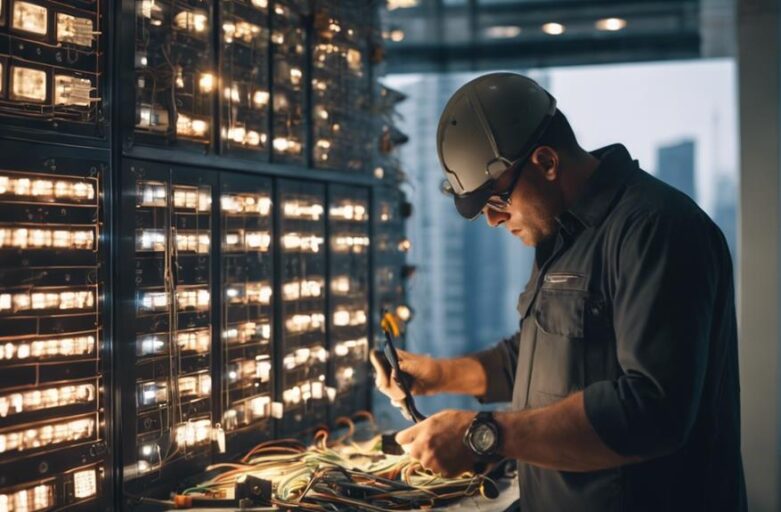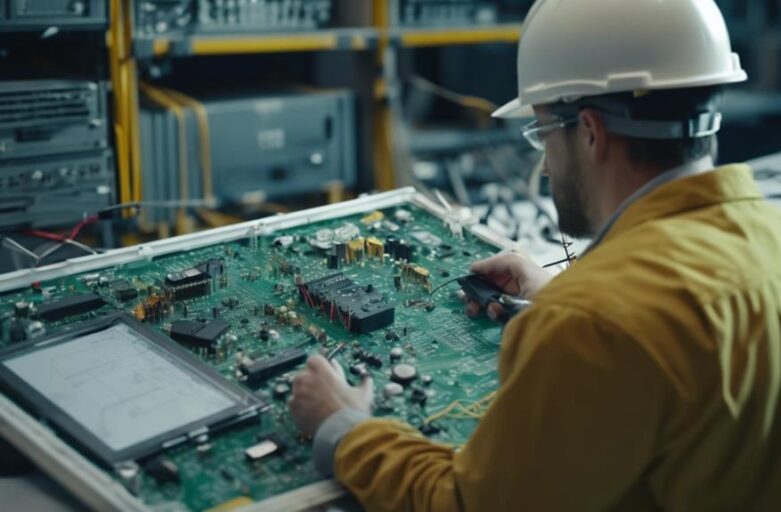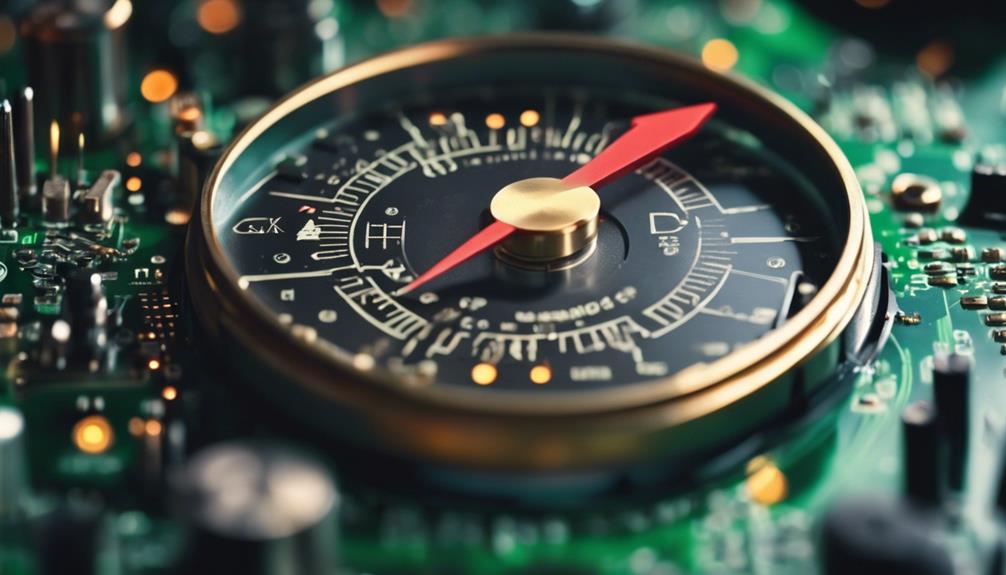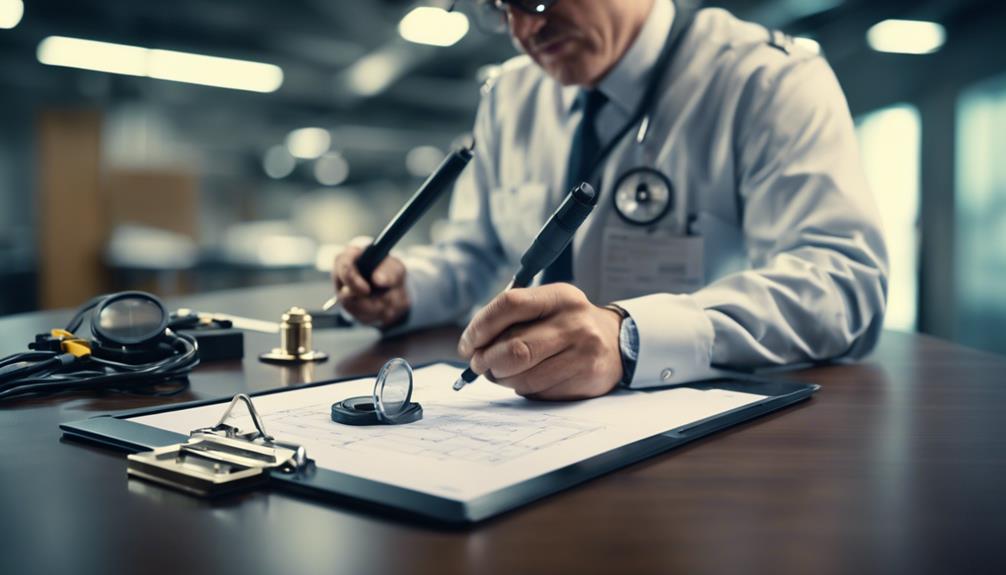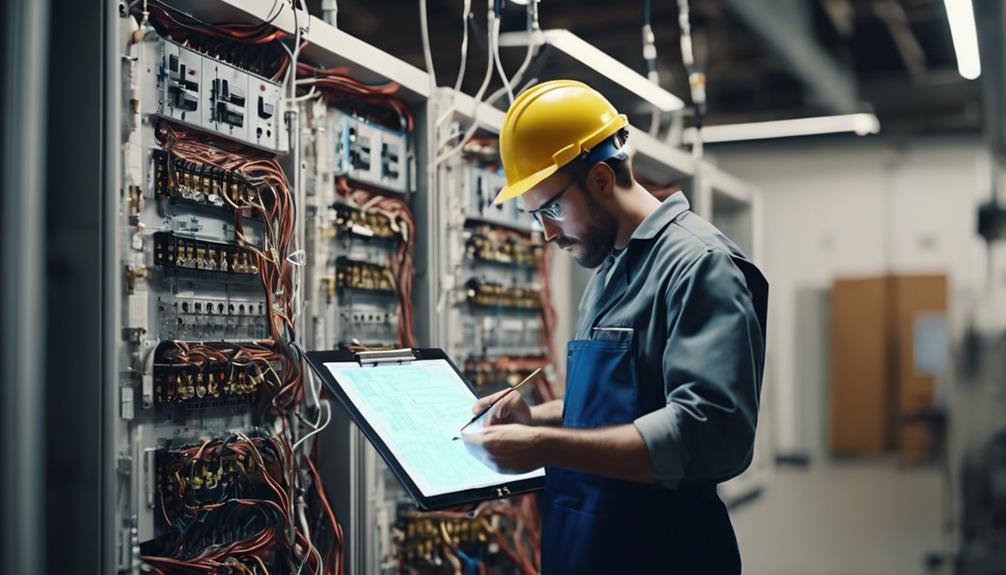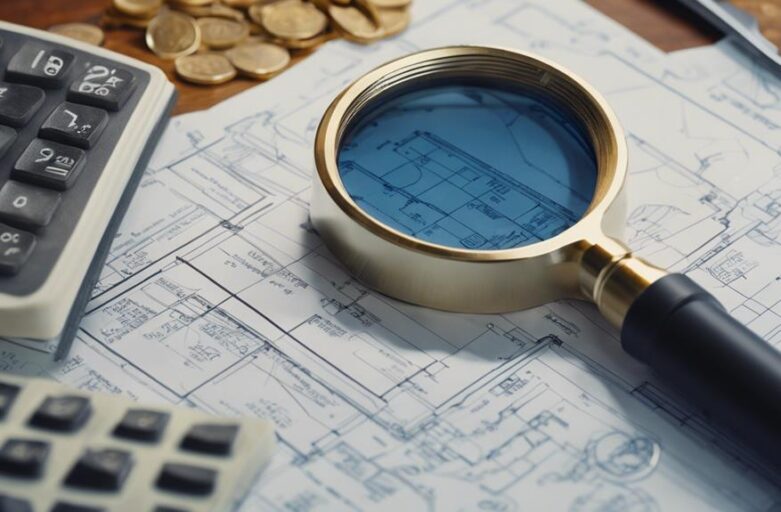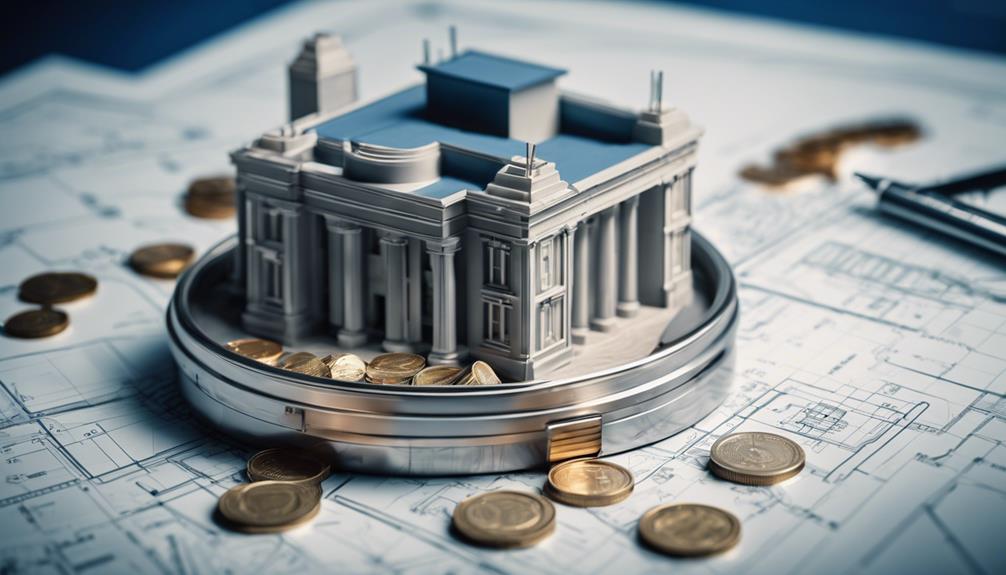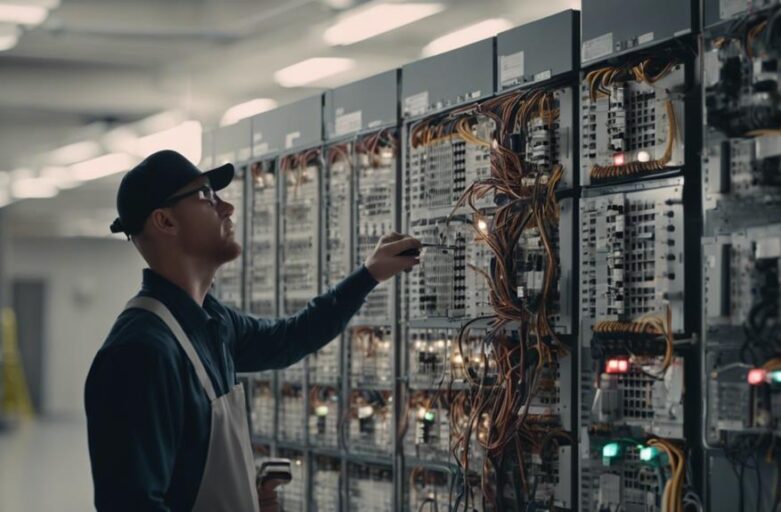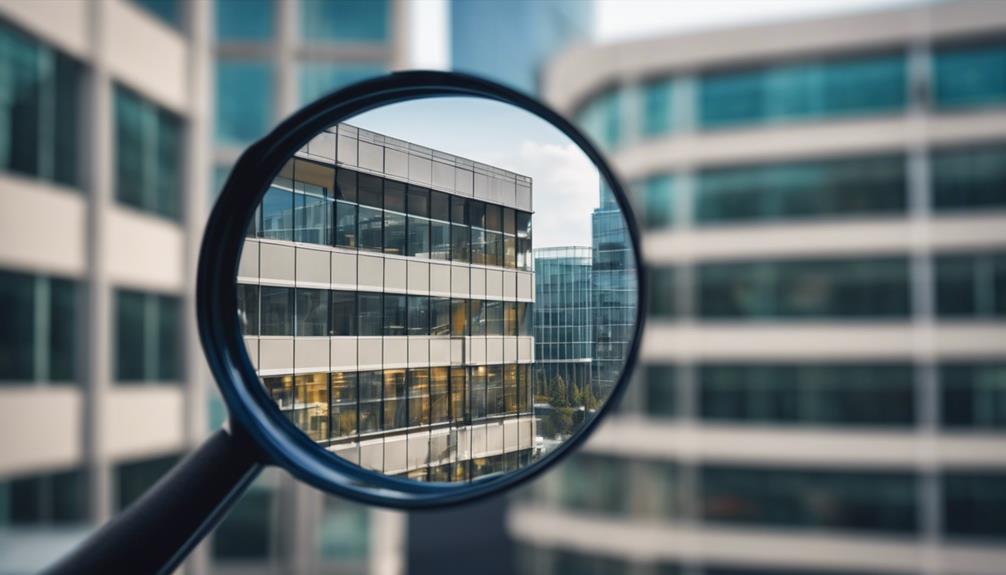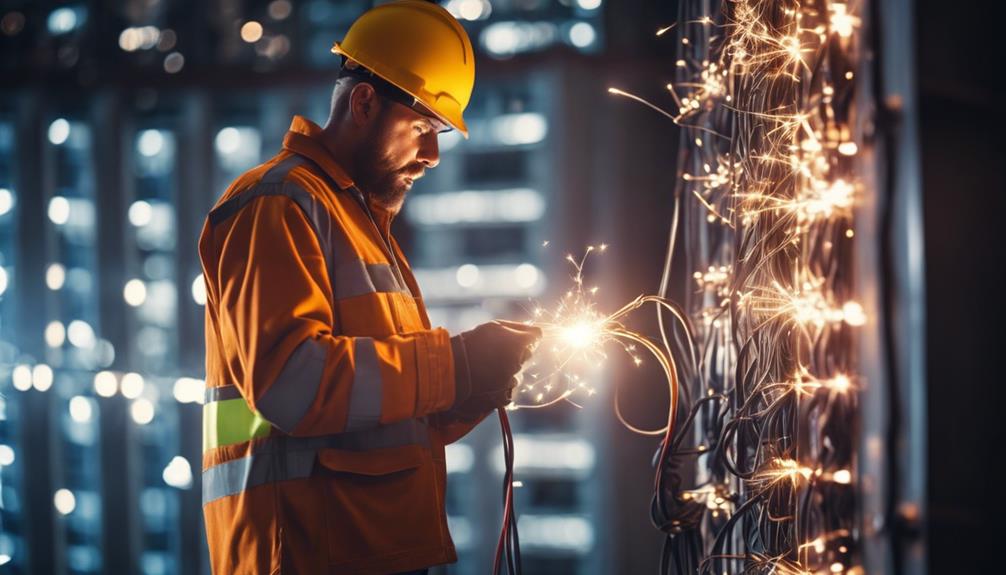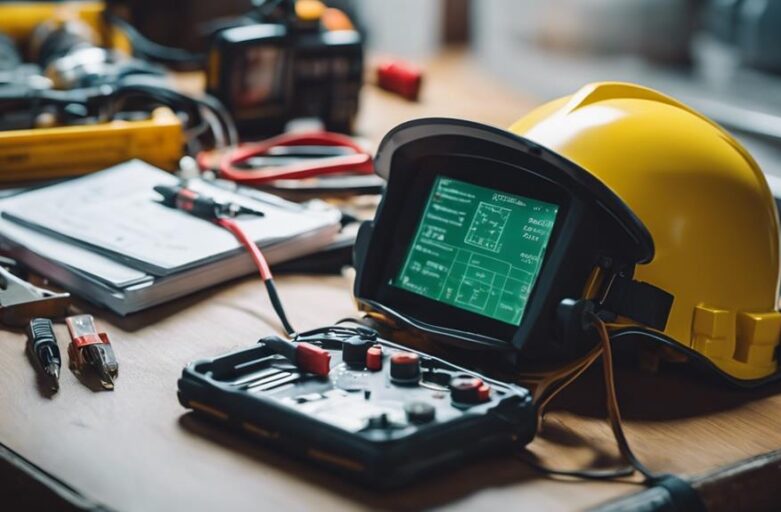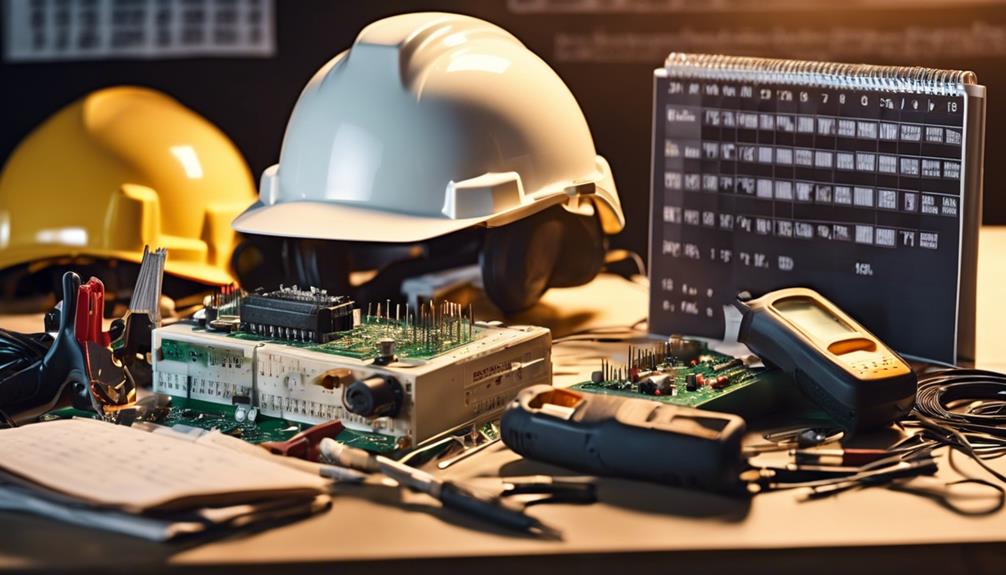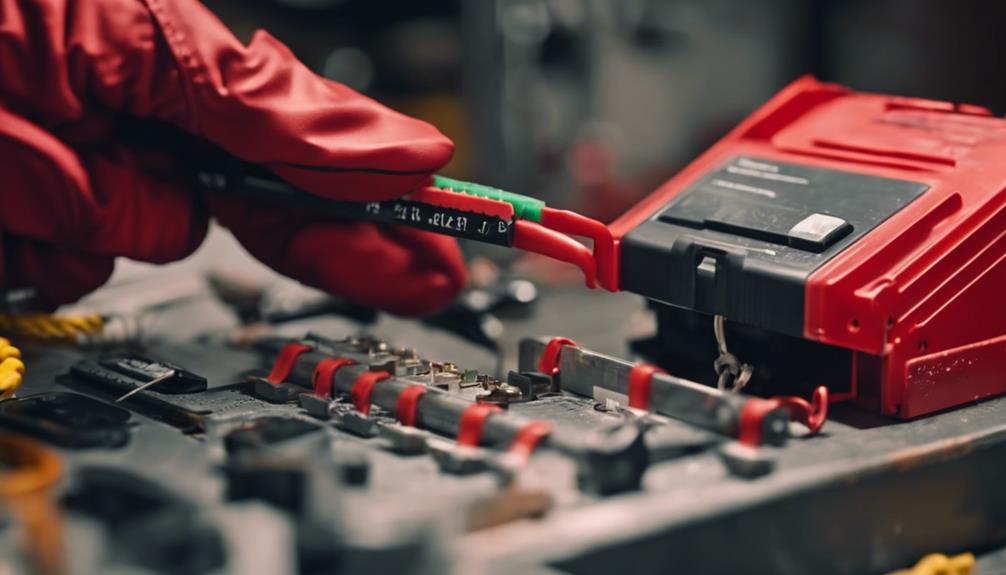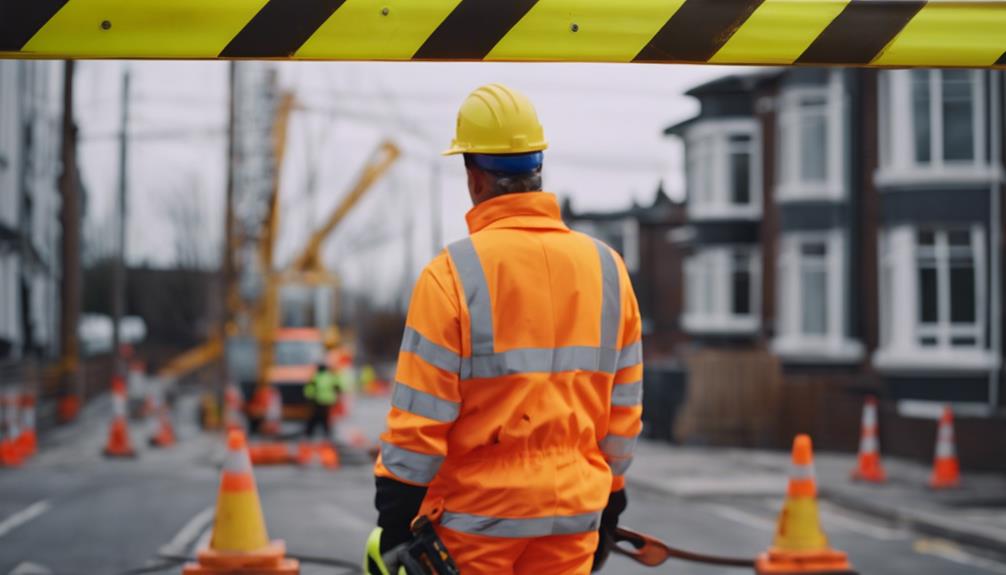To make sure a building's electrical system is safe and works well, there are a few steps you need to follow. First, you need to know what you're looking at. This includes checking things like wires and where you plug in appliances.
Before you start, you should be ready. Gather old reports and tools you might need. You're going to look at everything inside and outside the building. This means checking if outdoor lights work or if there's any problem with switches inside.
Safety is key. Make sure everything is up to code and write down what you see. You're not alone in this. Work with experts, they will help you understand better. Learn from them and the team you're working with.
While this process can be long, it's worth it. It leads to a safer building where everything works as it should. This is just the beginning, there's a lot more to learn about how electrical systems work. But don't worry, you're on the right path to success!
Key Takeaways
- Get ready for the check by gathering old reports, logs, and blueprints of the building. This will help guide you during the evaluation.
- Look over both the outside and inside of the building. Pay special attention to the lights, power units, and grounding systems.
- Follow all safety rules. This includes fire safety, building codes, and guidelines for people with disabilities. This will make sure the building is safe for everyone.
- Write down everything you find. This will help with future safety checks and to make sure the building follows all rules.
- Have experts in electricity join the inspection. They can help spot any problems and make the electrical systems more reliable.
Understanding Electrical Evaluation Basics
Let's chat about the basics of checking a building's electrical systems. This isn't just a simple task on your 'to-do' list. It's a vital part of keeping a building safe and running smoothly.
What happens during an electrical check-up? Experts take a close look at everything – from light switches and power outlets to circuit breakers and wires. They're on the hunt for anything that might be a safety risk, not following rules, or could be made better.
By having regular check-ups, you're helping to keep things running smoothly. Plus, you're protecting your building from electrical problems, fires, and other dangerous situations. So, when you think about these checks, see them as a way to keep your building safe and working well for a long time.
Don't see these check-ups as a nuisance, but as a way to make sure your building is at its best. By learning the basics of electrical check-ups, you're starting on the path to a safer and more efficient building.
Importance of Pre-Inspection Preparation
Understanding how to prepare for an electrical check-up is critical. It's like setting the stage for a successful examination of your building's electrical system.
Think of preparation as getting all your stuff in order. You need to collect all the documents such as past check-up reports, maintenance logs, and building plans. These papers are like your treasure map, leading you through the check-up process and making sure you don't miss anything.
Before you start, make sure you know how detailed each section of your check-up should be. Are you just taking a quick look, or do you need to do a deep dive? Knowing this will help you plan better and make sure your building's electrical system is safe.
And don't forget your gear! Just like a builder wouldn't show up without his hammer, make sure you have all the tools you need. The right tools can make your job go faster and easier.
Exterior Electrical System Assessment
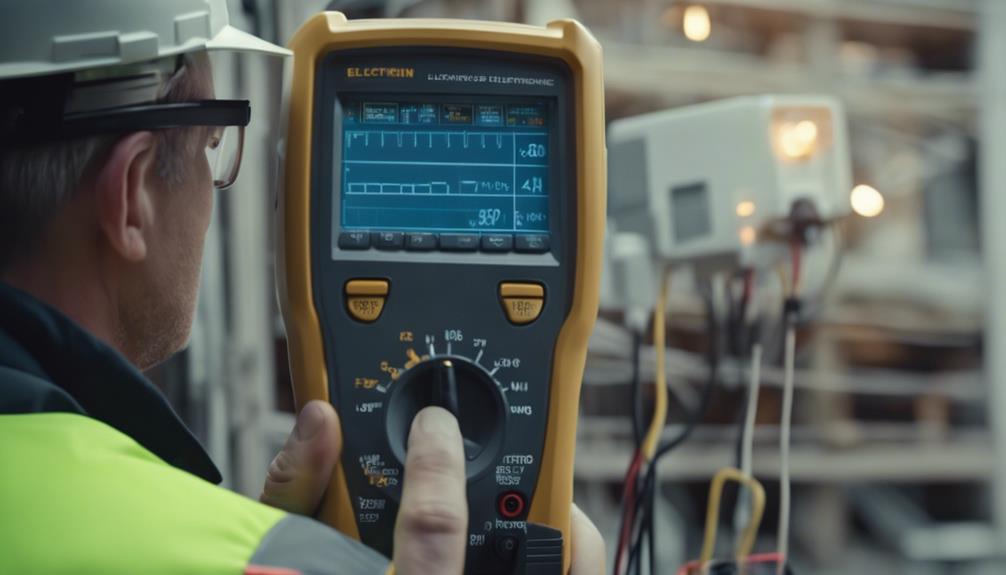
Let's explore the exciting world of assessing outdoor electrical systems. This includes checking everything, from the lights in your yard to units that distribute power. You need to make sure they're all working really well.
Also, it's crucial to take a good look at grounding systems. These need to not only work well but also meet strict safety rules.
Outdoor Lighting System Evaluation
Evaluating your outdoor lighting system is like giving your lights a check-up. You need to look at a few things to make sure they're doing their job well.
First, check out the light fixtures. Are they bright enough? Do they light up all the areas you need them to? This is important not just because it makes your building look good, but it also keeps you safe and helps your lights work better.
Next, take a look at the wires. They should be well-connected and safe. If not, they can cause hazards.
Also, consider your timers and sensors. They help save energy and make your lights work correctly. Do they turn your lights on and off when they're supposed to?
Lastly, see if there's any damage or wear on your lights that could stop them from working well. Remember, your outdoor lights aren't just for decoration. They play an important role in keeping your building safe and functioning well.
Assessing Power Distribution Units
Checking out the main part of your building's outside electric system is really important. This means looking at your power distribution units (PDUs) very closely. PDUs help spread electricity around your building.
Making sure your PDUs are properly grounded is like making sure your bike's brakes work – it's all about safety. If they're not grounded right, it could cause electrical problems. You also need to check if there's any rust on these units. Just like a rusty car, a rusty PDU mightn't work as well.
It's also important to make sure there's enough space around your PDUs. This helps keep the area safe for anyone working near them. Think of it like a soccer field – you wouldn't want to play a game if there wasn't enough room to move around, right?
We also have to look at the condition of the enclosures. Enclosures are like the protective case for your phone, they keep your PDUs safe from weather damage. And, don't forget about labeling your PDUs. It's just like labeling your school supplies – it helps you know what's what and makes it easier to take care of them.
Grounding System Inspection
Checking the grounding system of your exterior electrical system isn't just important, it's necessary for safety. This system works like a safety net, making sure electricity doesn't shock anyone. You have to check parts of the system like the rods, conductors, and connections to make sure they're working right.
This isn't just something to do for rules, it's about keeping your building and everyone in it safe. The bonding has to be just right to follow electrical standards. Inspectors will take a close look at the grounding system to protect your building from damage if there's a lightning strike or a power surge.
Always remember, a good grounding system means less chance for electrical problems and a safer place for everyone.
Interior Electrical System Examination
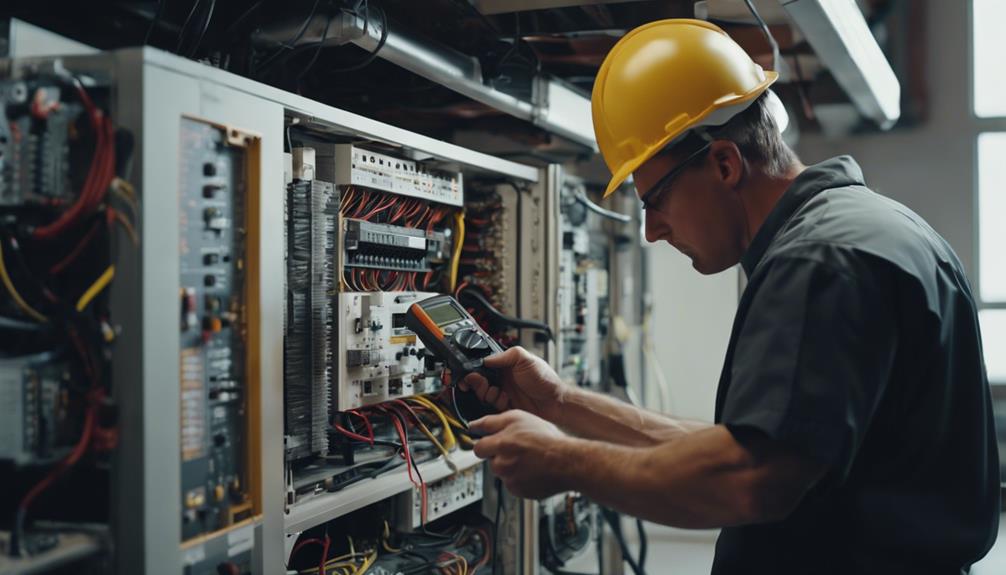
When checking the electrical system in your building, you need to look at several things.
First, check out your lights. Make sure they're bright enough, save energy, and meet all the rules for buildings.
Next, look at the outlets and switches. They've to work properly, but also need to be safe. This means they must be grounded correctly to help keep everyone secure.
The electrical panel is like the heart of your system. You have to make sure it can handle all the electricity your building needs. Also, the labels on it should be correct and it should follow the NEC standards.
After that, inspect the wires in your building. Look for any signs of damage or wear. You also need to make sure they meet the code rules. This step is really important as it's not just about wires, but also about keeping everyone safe and comfortable.
Safety Compliance in Evaluations
It's really important to make sure your building is safe when it comes to electricity. That means following fire rules, building rules, and rules for people with disabilities. But it's not just about following rules. It's about caring for everyone who comes into your building and making sure they feel safe and welcome.
Safety isn't just ticking off a list during an inspection. It's about checking that things like fire alarms and sprinklers work properly, and making sure people can easily get out in an emergency. These things aren't just for following rules, but also for keeping everyone in your building safe.
Making safety a big deal in your electrical checks isn't just to avoid getting into trouble with the law. It shows you care about everyone in your building. It's like saying 'You are important. Your safety is important.' So, make safety a top priority in your electrical checks, not just because you have to, but because it's the right thing to do. After all, a safe building is a happy, welcoming building.
Documentation of Inspection Findings
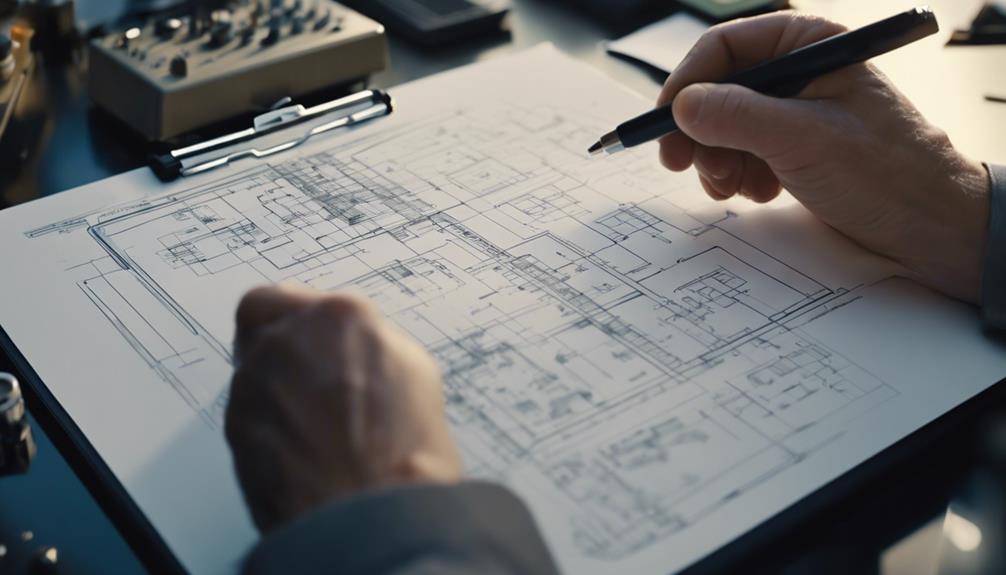
When you do an electrical safety check, it's like you're a detective. Your job is to write down all the clues you find. You can't skip any detail, even if it seems small. It's like putting together a puzzle.
When you write things down clearly and in order, it's easier for everyone to understand. Plus, your notes can be used again for the next safety check. It's like your own personal guidebook for keeping things safe.
Recording Inspection Observations
When you're checking things in your building, it's super important to write down everything you see. Think of your Electrical Inspection Checklist as your best friend that helps you spot issues and make sure everything is safe.
When you write down what you see, be really clear about the state of the equipment, if there are any safety risks, and if anything is different from what the building rules or the makers of the equipment say.
Using forms or computer programs can help you keep track of what you've found, and make it easier to look at later. Don't forget, these notes aren't just a list, they're a tool to help you find parts of the building that need fixing or need to be looked at again.
Your careful notes help keep the building safe and working well, which makes you a key player in the team.
Importance of Detailed Notes
Detailed notes are super important, especially when inspecting electrical stuff for safety. They help find possible dangers and parts that need to be better. They're also key for planning fixes and figuring out how much money is needed. Without good notes, we wouldn't know the best way to make our buildings safer.
We're all on the same team here, wanting our buildings to be as safe as possible. That's why having correct notes is so important. They make sure everyone knows what's going on and helps us all feel safer. So, let's get down to business and pay attention to the small stuff!
Good notes aren't just about one building being safe. They help us all work together to create an environment where safety is key. So, let's make the most of them and work together for a safer place for everyone.
Organizing Inspection Findings
In the world of checking electric stuff, keeping track of what you find is super important. It's not just a good thing to do, it's a must-do to keep buildings safe and sound. You're part of a group that cares a lot about making sure commercial buildings are top-notch and safe.
Every part of the electric system needs a good look-over, and every little bit counts.
Your notes, with drawings, measurements, and pictures, help guide what needs to be done next. It can help with upkeep, making things better, and making sure everything is following the rules. Arrange your report by the parts of the systems, problems you find, and what steps should be taken next. Make sure everyone can understand it – from the people who own the building to the people who check to make sure rules are being followed.
Reporting the Evaluation Results
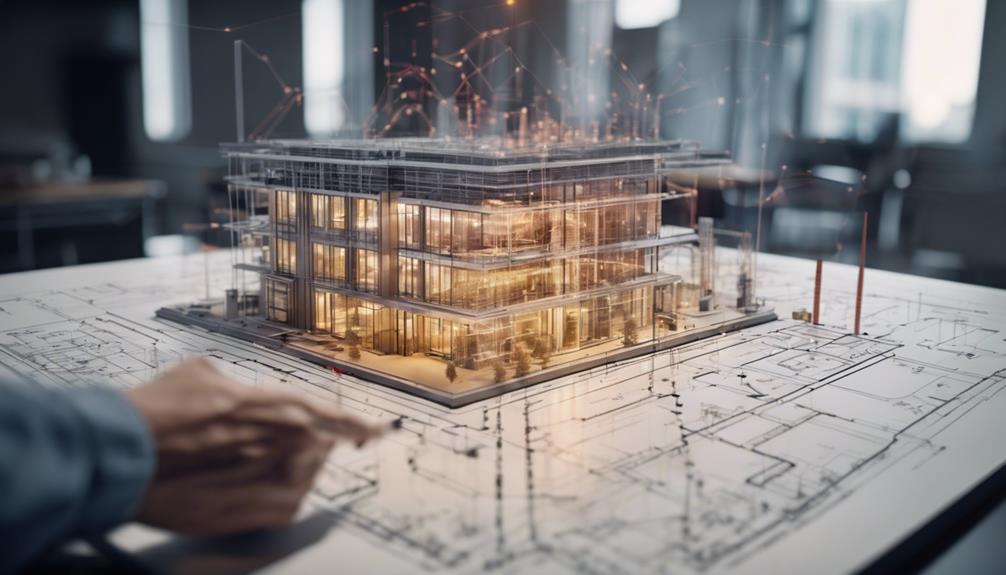
To make sure you fully understand how your building's electrical systems are doing, we need to carefully write down all the results from our check-ups in a big report. This report is really important for anyone who manages a building, especially if it's a business building. It's like a picture that shows exactly how your electrical systems are doing right now. It spells out all the facts and details in a way that makes it easy to see if you need to fix or improve anything for safety reasons.
Clear, thorough reporting doesn't just help you follow the rules, it also helps everyone who's involved feel like they're part of the team. It keeps everyone updated, from the people who own the building to the electricians who work on it. This helps everyone trust each other and work together. Your report should be a big book of knowledge that points out any possible dangers and explains what needs to be done about them.
Specialist Involvement in Inspections
Electrical experts play a big part in checking things – it's really important. These gurus do more than just give advice; they know a lot about safety rules.
This helps make sure everything is up to par. Their thorough checks find problems and suggest ways to make your electrical systems work better and more reliable.
Role of Electrical Professionals
Electrical experts play a super important role in checking out your building's electrical systems. They make sure everything is in line with safety rules and is working at its best. These pros know more than just the simple stuff. They can spot possible problems and suggest ways to make things safer.
Because they're involved early on, they can catch problems before they turn into big issues. This helps prevent electrical breakdowns and lowers the chance of fires or shocks. They know all about the rules for installing and maintaining electrical systems, so they can share the best ways to do things.
When you work with these experts, you can be sure your building's electrical systems are checked properly. This helps keep everything running smoothly and safely. We're all part of a group that cares about safety and doing things efficiently, and these experts help us do just that.
Importance of Specialist Consultation
You know how you go to a doctor when you're sick? Well, buildings also need their own doctors when it comes to their electrical systems. These doctors are known as specialists.
Why do we need specialists? They've a lot of knowledge about the ins and outs of a building's electrical system. They make sure everything follows the rules and meets the standards set by the industry. Think of them as your building's best friends who help you during inspections. They spot anything that could go wrong and offer the right solutions to fix them.
Take generator systems for instance. They can be really tricky to handle. But a specialist knows just what to do to make them work better and safer. This way, you can save money and avoid any accidents in the future.
But it's more than just getting advice from an expert. It's like being part of a group that's all about safety and doing the best they can. So, remember, specialist consultation is really important. They use their expertise to help you make the right decisions and to give you peace of mind.
Detailed Inspection Protocols
Ever saw a detailed check-up of your building's electrical system? It's done by experts who know a lot about electricity. They follow a set of rules called the National Electrical Code (NEC). They check each part of your electrical system carefully. They find any problems and suggest how to fix them.
This helps your building follow the rules. It also makes your building work better. These experts can tell you how to use your electricity better and more safely. So, getting an inspection isn't just about checking things. It's also about getting helpful tips to make your building safer and better.
This process is part of a team effort to be excellent and safe.
Continuous Learning for Inspection Teams
For your inspection team to be really good, they need to keep learning all the time. This means always knowing about the newest rules and gadgets related to electricity. You can't just learn this stuff once; you have to keep at it to make sure your electrical checks are top-notch.
Remember, checking buildings isn't just about making marks on a checklist. Your team needs to really understand the National Electrical Code (NEC) and be super familiar with the newest ways of doing things. These things change a lot. But if your team stays in the know, they can give really good and detailed checks to make sure everything is safe and follows the rules.
You should have regular training times to help your team get better. Push them to go to learning events and earn special certificates. This doesn't just make them better at their job, but also helps them do it faster. Always learning new things is really important for your team to grow and do really good work.
Ensuring Quality in Electrical Evaluations
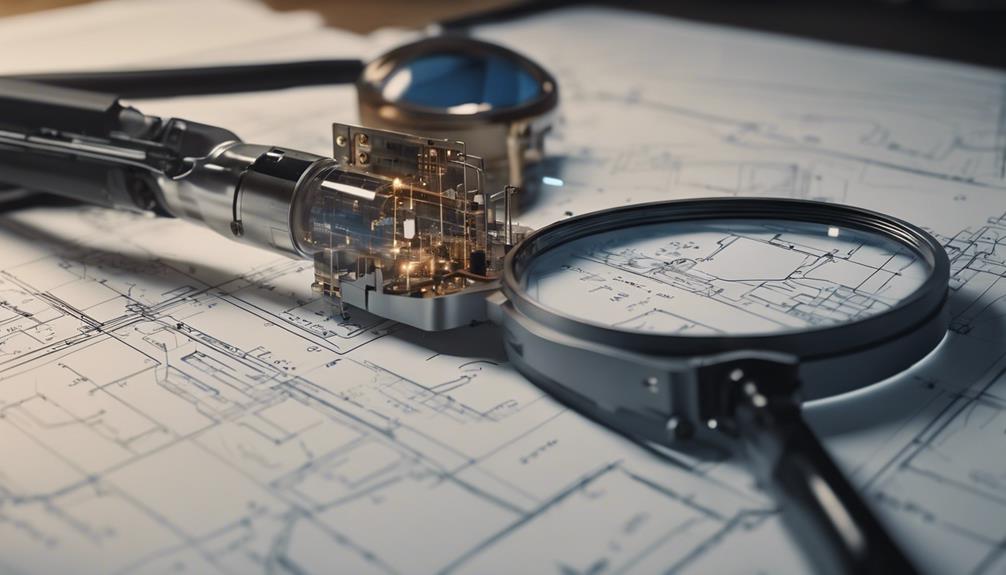
Your hard work in doing thorough checks on electrical systems is very important. You look at things like the wires that bring power into a building, the main box that sends electricity to different parts of the building, and safety devices that prevent dangerous electrical shocks.
Here's an easy way to understand what you're checking and why it's important:
| What You're Looking At | Why You Look At It | What It Does For the Building |
|---|---|---|
| Wires Bringing Power In | They kick off the whole electrical system | They decide how much power the building gets |
| Main Electrical Box | It's like the brain of the system | It makes sure electricity goes to the right places |
| Safety Systems | They help avoid electrical shocks | They make the building safer |
| Smaller Wiring | It helps spread power around safely | It helps the system work properly |
| Protective Tubes for Wires | They keep the wires safe and guide them | They help the system last longer |
Conclusion
Electric checks in buildings are very important. Here are some top tips to do a great job.
First, get ready well before you start, and write a clear report when you're done. It's really key to have experts on your team and always be learning new things.
Quality is super important. A good check isn't just about making a list and checking things off. It's about making sure everything is safe, follows rules, and will last a long time.
Always remember why you're doing this and you'll do an awesome job every time.…


